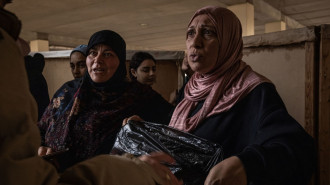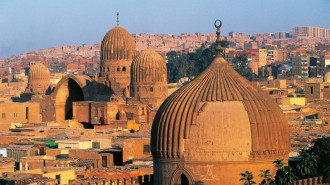
Defending history: '48 Palestinians fight against Judaization of ethnically cleansed Nakba villages

An "anti-Judaization" campaign is underway in the city of Umm al-Fahm and across the Wadi Ara area in northern Israel led by residents who are determined to oppose Israeli plans to "develop tourism" in the depopulated Palestinian village of Lajjun, in addition to 13 other villages in the Ar-Ruha region (also known as the Manasseh Hills).
The plans, according to the region’s inhabitants — predominantly Palestinian citizens of Israel (also known as '48 Palestinians) — aim to Judaize the region and transform the formerly Palestinian village lands, ethnically cleansed in 1948, into Israeli tourist sites.
Lajjun, the ruins of which today are situated in Haifa district was a Palestinian village within the Jenin district before the 1948 Nakba ("Catastrophe") when Zionist militias forcibly expelled over 80 percent of the Indigenous Palestinian population.
Ethnically cleansed in 1948
It lay at the entrance to the Wadi Ara (the Ara Valley), in which the villages Ar'ara, Kafr Qara and Umm al-Fahm are situated. The residents of Wadi Ara are mainly Palestinian citizens of Israel.
Lajjun was ethnically cleansed alongside other villages in the district in mid-1948 before the Zionist militias attempted to take the city of Jenin, which failed.
Many of Lajjun's inhabitants were expelled to nearby Umm al-Fahm, which today is populated entirely by '48 Palestinians.
Adham Jabarin, a member of the Umm al-Fahm Municipality, told Arab 48 news agency: "Lajjun's case is our highest priority, and is an important issue to us right now, with efforts on Lajjun being combined from various sides – official, popular and professional.
"We're working together to thwart the plans to take over and Judaise the depopulated village, alongside 13 other villages in the ar-Ruha area."
Although many of Lajjun's descendants remained in what became the State of Israel, following 1948, the internally displaced (labelled "present absentees" by Israel) were not allowed to return to their forcibly abandoned villages.
Israel seized vast swathes of Palestinian-owned land through the Absentees Property Law and imposed tight restrictions on the movement of Palestinians who had managed to stay, preventing their return to their destroyed villages, even after they gained Israeli citizenship in 1980.
However, as with most Palestinians, for many the dream of returning to their original villages has never disappeared.
Community mobilisation
To defend their claim to Lajjun and the other villages, residents of the Wadi Ara region have established "special committees" that have enlisted the support of volunteer lawyers to collect as many citizens' objections as possible.
They have also submitted the professional objections of the villages' "popular committees" and local authorities.
|
|
Umm al-Fahm's Popular Committee has organised meetings to discuss how to oppose the Judaization of Lajjun, as well as possible protest actions. One action taken in recent weeks has been locals holding Friday prayers amidst the village ruins.
Jabarin explained that right now, campaigners were focusing on gathering all the objections to the plans from residents and families, "especially those who own lands in any of the 14 villages. This is so the objection will encompass all the targeted villages and will involve inhabitants of the entire Wadi Ara area, from Ar'ara, Kafr Qara, Umm al-Fahm, and Tal'at Ara and Basma Ara."
Jabarin explained that the volunteer lawyers were meeting residents and helping them with the process of submitting their objections.
He said the Umm al-Fahm Municipality would submit its "political and professional opposition to the plans" in parallel to and coordinated with other groups, including the Committee for the Defence of ar-Ruha Lands, the Umm al-Fahm Popular Committee and the Committee for the Commemoration of the Lajjun and Umm al-Fahm Martyrs.
However, he added that while the legal and formal steps were important, the "popular struggle" was the most crucial aspect to the campaign: "The popular struggle must go hand in hand with the professional struggle, and the popular struggle — and the holding of prayers in Lajjun — must continue."
Ziyad Amin Tamish, an internal refugee from Lajjun, said: "Opposition to the plans from the families and lawyers continues. We, as Lajjun's descendants, have utterly refused to sit with the authorities and discuss the plan because if we were to sit, this would be interpreted as us not fundamentally objecting to the plan, which we do. Therefore, we have categorically refused to sit and discuss the blueprints."
He added that some Umm al-Fahm officials had sat with officials from the Megiddo Regional Council, which "we found out when the commemorative plaque we put in Lajjun was stolen."
He explains that when he and others enquired about the removal of the memorial, on which was inscribed the names of Palestinian martyrs from the 1936-9 Palestinian revolt, "we learned that [Umm al-Fahm] officials had spoken to the Megiddo administration."
Lajjun descendants reject Judaization
Tamish says Lajjun's descendants won't accept "any negotiation around Lajjun to any extent, because the entire village belongs to us. It's good that the Umm al-Fahm officials have stepped back from the idea of sitting with the officials in Megiddo."
He added that when it came to Lajjun and the other depopulated villages, refusing "any monetary compensation or land" was a matter of principle.
"We are determined Lajjun's lands won't be compromised, and we won't accept any deals, especially since we have official documents proving our ownership of land in Lajjun. Therefore we have not and will not accept any deals or discussion of the proposals; we reject the Judaization plan."
Regarding upcoming actions, he says steps including demonstrations outside the regional Megiddo council offices are planned, as are continued Friday prayers in Lajjun, alongside other activities.
He remarks that Megiddo Council has already seized control of 34,000 dunams (approximately 34 sq km), so the protest campaign needs to keep building momentum.
"We won't allow the Judaization of Lajjun, which is a vital breathing space for us and the residents of Umm al-Fahm and the Wadi Ara region."
Regarding the insistence by the Megiddo Council on this issue, Tamish explained that "the real concern of Megiddo Council and Israeli officials, particularly in the case of Lajjun, is that the inhabitants will demand the lands and sacred sites they were displaced from [be restored to them], and this becomes recognised by the court.
"Their real fear is that such a situation could act as a precedent and open up space for citizens to lay claim to [land in] over 500 depopulated villages. They know this, and therefore are aiming to Judaize Lajjun so that entry and exit to Lajjun will be fully under their control."
This is an edited translation with additional reporting. To read the original article click here
This article was originally published by Arab48
Translated by Rose Chacko

![Palestinians mourned the victims of an Israeli strike on Deir al-Balah [Getty]](/sites/default/files/styles/image_684x385/public/2024-11/GettyImages-2182362043.jpg?h=199d8c1f&itok=xSHZFbmc)


![The law could be enforced against teachers without prior notice [Getty]](/sites/default/files/styles/image_684x385/public/2178740715.jpeg?h=a5f2f23a&itok=hnqrCS4x)
 Follow the Middle East's top stories in English at The New Arab on Google News
Follow the Middle East's top stories in English at The New Arab on Google News


